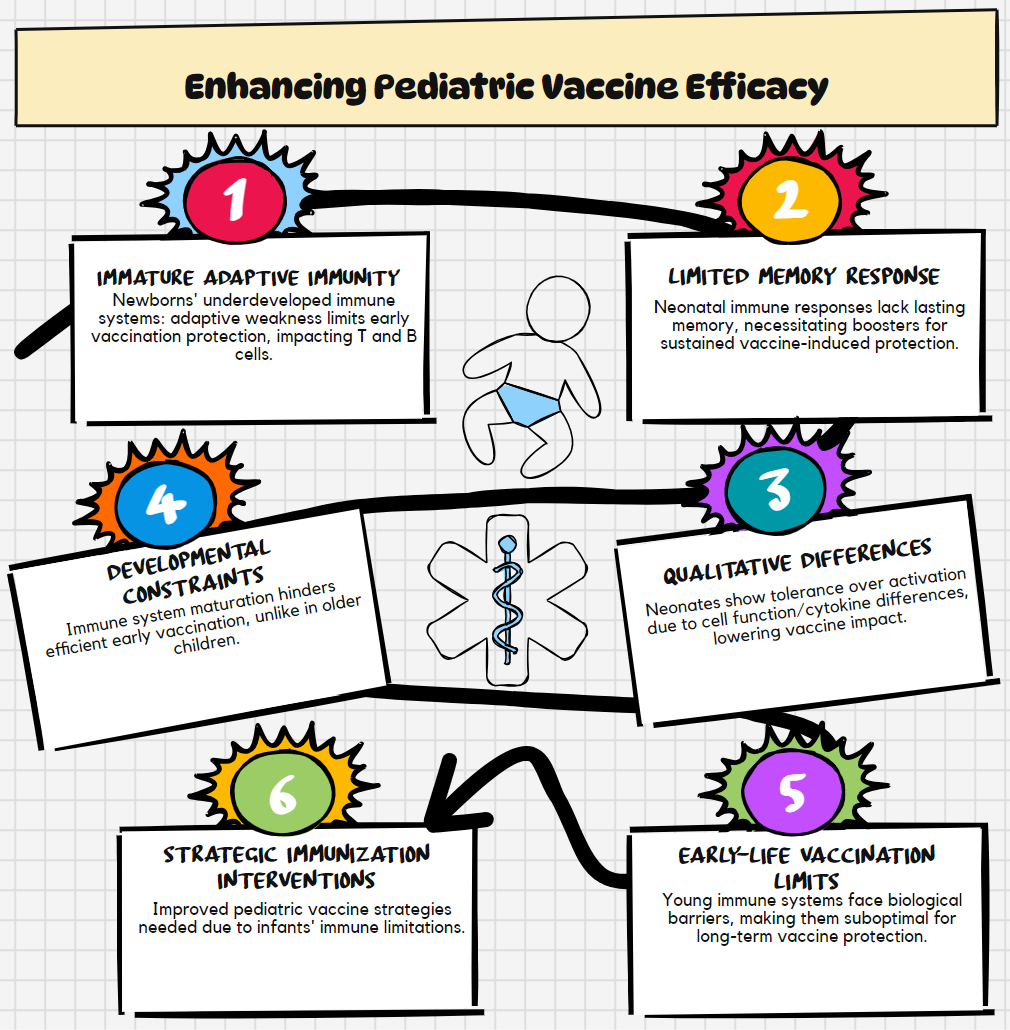Early-Life Adaptive Immunity to Guide Interventions for Pediatric
While infants can mount adaptive immune responses, their ability to develop robust, long-lasting immunity is significantly restricted compared to older children and adults.
This restriction stems from the developmental immaturity of the neonatal adaptive immune system, which includes T cells, B cells, and antigen-presenting cells (APCs).
- Underdeveloped T-Cell Responses: T cells are essential for coordinating immune responses and establishing immunological memory, which is critical for long-lasting immunity. In neonates, T cells exhibit functional limitations, such as reduced proliferation and cytokine production (e.g., lower levels of pro-inflammatory cytokines like IFN-γ). This dampened T-cell activity hinders the ability to mount a vigorous and sustained response to vaccine antigens, limiting the generation of memory T cells that would protect against future exposures.
*B-Cell and Antibody Production Constraints: B cells in neonates are less capable of producing high-affinity antibodies, a process vital for long-term protection. The article highlights that neonatal B cells have a reduced capacity for somatic hypermutation and class-switch recombination—mechanisms that refine antibody specificity and shift production from IgM to more durable IgG or IgA. As a result, vaccines administered early in life often elicit weaker and shorter-lived antibody responses compared to those in older children and adults, whose B cells are more mature and efficient.
-
Skewed Immune Bias Toward Tolerance: The neonatal immune system is evolutionarily programmed to favor tolerance over activation, likely to prevent excessive inflammation in utero and during the transition to the microbe-rich postnatal environment. This bias, mediated by regulatory T cells and anti-inflammatory cytokines (e.g., IL-10), suppresses the robust immune activation needed for vaccines to induce long-lasting immunity. In contrast, older children and adults have a more balanced immune profile, allowing for stronger and more persistent responses to vaccination.
-
Impaired Immunological Memory Formation: Long-lasting immunity relies on the establishment of memory T and B cells that can quickly respond to subsequent encounters with a pathogen. The article explains that neonates struggle to generate these memory cells effectively due to both intrinsic cellular limitations and an immature network of APCs, such as dendritic cells. These APCs are less adept at presenting antigens and co-stimulatory signals in neonates, further compromising the development of a durable memory response. In older individuals, this process is far more efficient, leading to prolonged immunity post-vaccination.
-
Gradual Maturation Over Time: The restriction in long-lasting immunity is tied to the ontogeny of the immune system, which matures progressively through infancy and childhood. The article notes that as children age, their immune systems gain enhanced functionality—such as improved T-cell signaling, better APC maturation, and more effective B-cell responses—enabling vaccines to confer stronger and more persistent protection. In adults, these components are fully developed, allowing for optimal vaccine-induced immunity that can last years or even decades.
In essence, the significant restriction of long-lasting immunity in neonates and young infants, as compared to older children and adults, arises from a combination of underdeveloped cellular responses, a tolerogenic immune bias, and an inefficient capacity to form immunological memory. These factors collectively diminish the effectiveness of early-life vaccination in providing sustained protection, necessitating strategies like booster doses or adjuvants to bridge this gap as the immune system matures.

Key points supporting - Children do not derive optimal benefit from vaccines at early ages include:
-
Immature Adaptive Immunity: Newborns have underdeveloped immune systems, particularly in their adaptive immunity, which includes T and B cells critical for generating memory responses to vaccines. This immaturity limits the strength and duration of immune protection elicited by early vaccination.
-
Limited Memory Response: The article notes that neonatal adaptive immune responses often fail to produce effective immunological memory, a cornerstone of vaccine-induced protection. This means that vaccines administered in early infancy may not provide sustained immunity, requiring boosters later in life.
-
Qualitative Differences: The immune responses in neonates are skewed toward tolerance rather than strong activation, partly due to differences in immune cell function and cytokine profiles. This dampened response reduces the effectiveness of vaccines in triggering a protective immune reaction.
-
Developmental Constraints: The authors emphasize that the ontogeny of the immune system—its gradual maturation over time—means that early-life vaccinations face inherent biological barriers, making them less efficient at conferring long-term protection compared to vaccinations given at older ages.
This suggests that the neonatal immune system's limitations—such as its immature state and reduced capacity for memory—result in suboptimal benefits from vaccines in very young children, underscoring the need for tailored strategies to improve pediatric immunization outcomes.
The article "Understanding Early-Life Adaptive Immunity to Guide Interventions for Pediatric Health," published in Frontiers in Immunology on January 21, 2021, explores the limitations of the neonatal immune system and its implications for vaccine efficacy in early life. Digg In @ FronteirsIn.org
